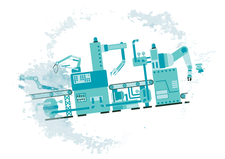Zim, the cross-platform desktop wiki
Daily Diary

Organize your ideas, notes, and shopping lists with Zim, a handy tool that enshrines the principle of the wiki on your Linux, Mac OS, or Windows desktop.
The word wiki [1] comes from Hawaiian and means "fast." The term refers to a system in which HTML documents on the Internet are both read and edited using a web browser. The most prominent example of a wiki is the Wikipedia online encyclopedia.
Other wikis inhabit both large and small projects within the open source universe. Many wikis are used for documentation purposes. Debian, Ubuntu, and Arch Linux are known for their comprehensive wikis. A wiki's main task is to organize content in a structured way. Many of the popular wiki tools are designed for collaboration over the network, but the wiki concept also provides benefits for a single user working at a single desktop. Zim is a handy desktop wiki that is useful for brainstorming and knowledge gathering, as well as building task lists and organizing documents and books.
Versatile
Zim [2] transfers the principle of a wiki to the desktop. To operate Zim, you do not need a web server or a database (Figure 1). The Zim desktop wiki is available for Linux, Mac OS X, and Windows; it uses the same data format across all platforms. If you are looking for something to compare to Zim, a tool from the Windows world that also runs on Linux, such as WikidPad [3], is conceptually similar, but Zim goes well beyond WikidPad's capabilities.
[...]
Buy this article as PDF
(incl. VAT)
Buy Linux Magazine
Subscribe to our Linux Newsletters
Find Linux and Open Source Jobs
Subscribe to our ADMIN Newsletters
Support Our Work
Linux Magazine content is made possible with support from readers like you. Please consider contributing when you’ve found an article to be beneficial.

News
-
Introducing matrixOS, an Immutable Gentoo-Based Linux Distro
It was only a matter of time before a developer decided one of the most challenging Linux distributions needed to be immutable.
-
Chaos Comes to KDE in KaOS
KaOS devs are making a major change to the distribution, and it all comes down to one system.
-
New Linux Botnet Discovered
The SSHStalker botnet uses IRC C2 to control systems via legacy Linux kernel exploits.
-
The Next Linux Kernel Turns 7.0
Linus Torvalds has announced that after Linux kernel 6.19, we'll finally reach the 7.0 iteration stage.
-
Linux From Scratch Drops SysVinit Support
LFS will no longer support SysVinit.
-
LibreOffice 26.2 Now Available
With new features, improvements, and bug fixes, LibreOffice 26.2 delivers a modern, polished office suite without compromise.
-
Linux Kernel Project Releases Project Continuity Document
What happens to Linux when there's no Linus? It's a question many of us have asked over the years, and it seems it's also on the minds of the Linux kernel project.
-
Mecha Systems Introduces Linux Handheld
Mecha Systems has revealed its Mecha Comet, a new handheld computer powered by – you guessed it – Linux.
-
MX Linux 25.1 Features Dual Init System ISO
The latest release of MX Linux caters to lovers of two different init systems and even offers instructions on how to transition.
-
Photoshop on Linux?
A developer has patched Wine so that it'll run specific versions of Photoshop that depend on Adobe Creative Cloud.
